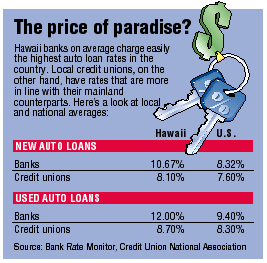

The gap between Hawaii and
By Rob Perez
mainland interest rates is so
large it baffles experts
Star-BulletinHawaii banks by a huge margin charge the highest interest rates in the country for auto loans, a new survey shows.
The local averages for new- and used-car fixed-rate loans are more than 2 percentage points above the national averages and nearly 2 points greater than levels in the other most costly states, according to February statistics compiled by Bank Rate Monitor, a Florida publication that tracks the industry.
The rate gap is so large mainland experts say they are baffled.
"It's so pronounced that there has to be some reasoning behind it, but I don't know what that could be," said Greg McBride, a Bank Rate financial analyst.
One expert suggested the institutions may be taking advantage of consumers who don't realize credit unions offer far better deals.
"The banks could be preying on the fact that there's a significant group in the population who just don't get it," said Jack Gillis, author of a car-buying book and spokesman for the Washington, D.C.-based Consumer Federation of America.

The banks, however, provide a far different take on the numbers, saying the survey doesn't reflect the kind of rates most Hawaii consumers actually get.First Hawaiian Bank executive Mark Felmet said most of its customers are issued variable-rate auto loans, not fixed-rate ones.
Variable loans in recent years have proven more beneficial to customers, said Felmet, senior vice president of First Hawaiian's retail loan division.
And the bank intentionally prices its fixed-rate loans higher to steer people to variable ones, which represent less risk to the bank, Felmet said.
Because many mainland banks practice that same strategy, though, that wouldn't explain why Hawaii rates are so out of whack with those found in the rest of the country.
Felmet said he couldn't comment on the Bank Rate numbers because he was unfamiliar with how they were compiled.
The Florida organization calculated its Hawaii averages using rates from First Hawaiian, Bank of Hawaii, Hawaii National Bank and American Savings Bank, the state's three largest banks and largest thrift, respectively, according to McBride.
He said the four institutions' rates are representative of the Honolulu market.
Bank of Hawaii spokeswoman Linda Chinn cited market share as one reason her institution's rates are high.
She said Bankoh has such a small chunk of Hawaii's auto-loan market -- less than 5 percent -- that it is unable to spread the fixed costs for those loans over a large pool of business.
The difficulties of achieving such economies of scale contribute to the high rates, she said.
But the loan manager for Hawaii's largest credit union scoffed at such reasoning.
"I just can't see how that would hold water," said Eric Anderson of Hawaii State Federal Credit Union, a $400 million institution.
Anderson said the auto-loan volume at the multibillion-dollar Bankoh dwarfs the volume at his and other credit unions, yet even the smallest credit unions have rates more in line with industry averages.
"We all deal with the exact same issues," he said. "And you don't need economies of scale to offer reasonable rates -- unless you're trying to make huge, exorbitant profits."
According to Bank Rate's survey, Hawaii banks on average charge 10.67 percent for new-car loans and 12 percent for used-car loans, compared with the national averages of 8.32 percent and 9.4 percent, respectively.
By contrast, Hawaii credit unions as of the beginning of the year charged 8.1 percent and 8.7 percent, respectively, according to Mike Schenk, vice president of economics at the Credit Union National Association in Wisconsin.
A check of several Oahu credit unions Wednesday turned up new-car rates as low as 6.9 percent, while the lowest rate posted in the bank survey was 10 percent. Some major banks, including First Hawaiian and Bank of Hawaii, were quoting new-car rates as high as 11.25 percent this week.
Those kinds of differences can mean thousands of dollars in higher interest payments.
A four-year, $20,000 loan at 6.9 percent, for instance, amounts to a monthly payment of about $478. At 11.25 percent, the payment jumps $41 to $519 a month, or nearly $2,000 more in interest over the life of the loan.
Credit unions can charge less than banks because they are non-profit institutions that don't have to pay stockholders or worry about boosting bottom lines, industry officials say.
Another place to look for good rate deals: at auto dealerships. The financing arms of major auto manufacturers sometimes have discounted loans available through dealers, though such loans may be limited to specific models or come with other restrictions.
Hawaii banks have had a long track record of charging unusually high rates, according to Bank Rate.
Since the publication started compiling state auto rates in 1996, Hawaii has consistently had the country's highest averages by far, McBride said.
Interestingly, Hawaii rates for other banking products don't follow the same patterns. For personal unsecured loans, for example, Hawaii's average rate of 12.33 percent is well below the national average of 14.84 percent, according to Bank Rate statistics. Local mortgage rates also are lower.
Yet for certificates of deposit, Hawaii banks on average pay considerably less than their national counterparts, the latest data shows.
The high local auto rates underscore how costly buying a new car in Hawaii can be for unsavvy consumers.
Except for Alaska, Hawaii is the only state in the country where auto dealers routinely use second stickers to jack up manufacturers' suggested retail prices.
That means that shoppers who aren't knowledgeable, effective price negotiators can pay thousands more than they have to.
If they use a bank to finance the purchase, they could end up paying even more of a premium, consumer advocates warn.